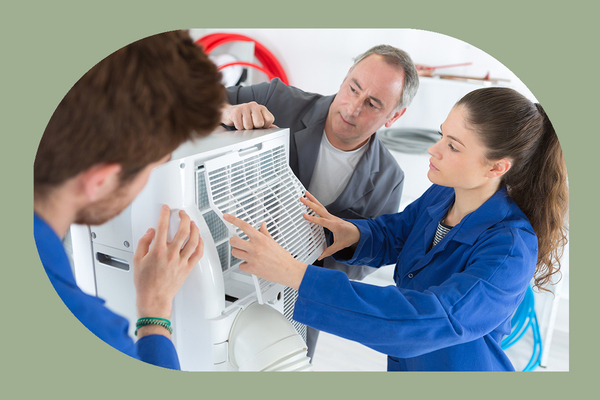HVAC technician training generally takes between six months and two years to complete, depending on whether your program is for a certificate, a diploma, or an associate’s degree. Nowadays, more and more employers are looking to hire HVAC technicians who have gone through training programs, as opposed to training them on the job. Because HVAC techs who’ve completed training are in higher demand, formal education is a worthwhile investment.
Types of HVAC Programs & Their Length
There are a few different types of HVAC training programs to consider, including trade school programs, college programs, and apprenticeship programs.
- Trade School HVAC Program Length – Trade school programs typically include six months to one year of training, and you’ll earn either a certificate or a diploma. Certification training programs may take as little as 6 months, while diploma programs are usually closer to one year long. The benefit of a certificate or diploma program is that you get out of school and start working relatively quickly.
- College HVAC Program Length – Some colleges have programs such as Associate of Science in HVAC Technology. For full-time students, these programs usually take about two years to complete. The benefit of getting your associate degree is that you can transfer the credits to a four-year college and go deeper into HVAC, maybe even becoming an engineer.
- Apprenticeship Program Length – Apprenticeships tend to include both formal education and paid on-the-job training. Apprenticeships often last between three to five years.
Requirements For HVAC School
To become an HVAC technician, you first must have a high school diploma or GED equivalent. You’ll need to be able to read and do math at a high school level. HVAC technicians carry heavy machinery and may need to access tight situations, so there can be physical requirements, as well.
Tip: If you’re in high school, you may want to enroll in a vocational program to get a head start with your education. Focus your studies on math and physical sciences. And, any experience you have with plumbing, electronics, and electrical will help you, as well.
In order to work as an HVAC tech and handle refrigeration chemicals, the EPA will require you to be certified. Read this Guide to EPA certification.
Find a local HVAC training program.
Reference:
